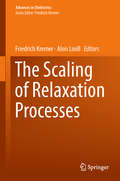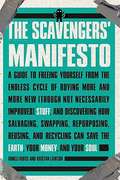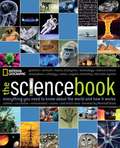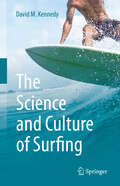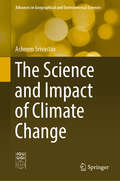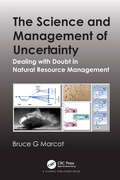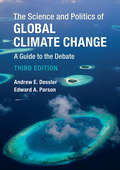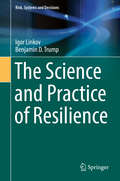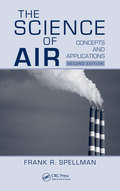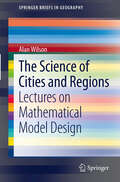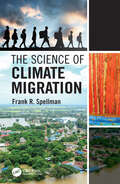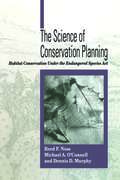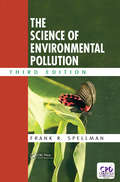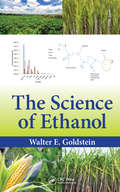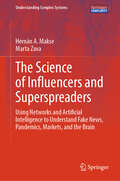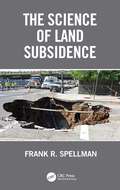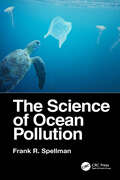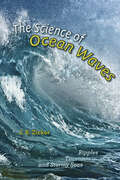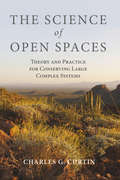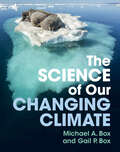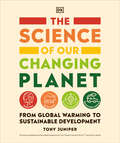- Table View
- List View
The Scaling of Relaxation Processes (Advances in Dielectrics)
by Friedrich Kremer Alois LoidlThe dielectric properties especially of glassy materials are nowadays explored at widely varying temperatures and pressures without any gap in the spectral range from µHz up to the Infrared, thus covering typically 20 decades or more. This extraordinary span enables to trace the scaling and the mutual interactions of relaxation processes in detail, e.g. the dynamic glass transition and secondary relaxations, but as well far infrared vibrations, like the Boson peak. Additionally the evolution of intra-molecular interactions in the course of the dynamic glass transition is also well explored by (Fourier Transform) Infrared Spectroscopy. This volume within 'Advances in Dielectrics' summarizes this knowledge and discusses it with respect to the existing and often competing theoretical concepts.
The Scavengers' Manifesto
by Anneli Rufus Kristan LawsonDestined to become the bible for a bold new subculture of eco-minded people who are creating a lifestyle out of recycling, reusing, and repurposing rather than buying new. An exciting new movement is afoot that brings together environmentalists, anticonsumerists, do-it-yourselfers, bargain-hunters, and treasure-seekers of all stripes. You can see it in the enormous popularity of many websites: millions of Americans are breaking free from the want-get-discard cycle by which we are currently producing approximately 245 million tons of waste every day (that's 4. 5 pounds per person, per day!). In The Scavengers' Manifesto, Anneli Rufus and Kristan Lawson invite readers to discover one of the most gratifying (and inexpensive) ways there is to go green. Whether it's refurbishing a discarded wooden door into a dining-room table; finding a bicycle on freecycle. org; or giving a neighbor who just had a baby that cute never-used teddy bear your child didn't bond with, in this book Rufus and Lawson chart the history of scavenging and the world-changing environmental and spiritual implications of "Scavenomics," and offer readers a framework for adopting scavenging as a philosophy and a way of life. .
The Schrödinger-Virasoro Algebra
by Claude Roger Jérémie UnterbergerThis monograph provides the first up-to-date and self-contained presentation of a recently discovered mathematical structure--the Schrödinger-Virasoro algebra. Just as Poincaré invariance or conformal (Virasoro) invariance play a key rôle in understanding, respectively, elementary particles and two-dimensional equilibrium statistical physics, this algebra of non-relativistic conformal symmetries may be expected to apply itself naturally to the study of some models of non-equilibrium statistical physics, or more specifically in the context of recent developments related to the non-relativistic AdS/CFT correspondence. The study of the structure of this infinite-dimensional Lie algebra touches upon topics as various as statistical physics, vertex algebras, Poisson geometry, integrable systems and supergeometry as well as representation theory, the cohomology of infinite-dimensional Lie algebras, and the spectral theory of Schrödinger operators.
The Science Book: Everything You Need To Know About The World And How It Works
by U. S. National Geographic Society Staff Marshall BrainThe Science Book: Everything You Need to Know About the World and How It Works encapsulates centuries of scientific thought in one volume. Natural phenomena, revolutionary inventions, scientific facts, and the most up-to-date questions are all explained in detailed text that is complemented by visually arresting graphics. Six major sections ranging from the universe and the planet Earth to biology, chemistry, physics, and mathematics are further broken down into subsections that encompass everything from microscopic life to nuclear power. The Science Book covers a wide range of scientific areas, providing both a general overview of topics for the browsing reader, and more specific information for those who wish to obtain in-depth insight into a particular subject area. Natural phenomena, revolutionary inventions, scientific facts, and up-to-date questions are explained in detailed texts. The vivid illustrations, pictures, and graphics throughout the book make the information even more accessible and comprehensible. Within the book, the theory of the universe and the character of the earth are detailed, along with an overview of the diverse living organisms that can be found on Earth. The technical developments and achievements of humankind are discussed and we pay particular attention to subjects of current interest, like climate change and genetic engineering. The well-structured organization of this book with its numerous sections and chapters offers the reader an entertaining introduction into the large field of natural sciences and allows just as well for quick reference. Events and issues of special significance are discussed in greater detail in side bars of 3 different kinds. Numerous cross-references within the chapters and to other sections of the book emphasize the many links between the individual scientific fields.
The Science and Culture of Surfing
by David M. KennedyThis volume explores all aspects of surfing from the underlying physics of waves, the shape of wave breaks through to the development of surf culture and its influence on society. It explores the links between science and engineering with arts, sociology and economics, all through the lens of surfing. The book provides the one-stop location of knowledge on this global sport, bringing together the leading researchers in the field in a coherent framework. The book will appeal to undergraduate students and the general public, and will cater to readers from all backgrounds due to its transdisciplinary reach.
The Science and Impact of Climate Change (Advances in Geographical and Environmental Sciences)
by Asheem Srivastav<p>This volume provides a holistic and concise overview of the complex science of climate change involving the interplay of multiple factors. It also acts as a primer and a one-source reference to all the aspects of climate change, allowing researchers to understand the complexity of this science and to see the larger picture, thereby aiming towards holistic solutions. <p>Beginning in the second half of the twentieth century, the impacts of climate change have been the worst nightmare to hit humanity so fiercely, causing loss of human life and irreparable destruction to natural and man-made infrastructure in many parts of the world. The difference between climate change now and in the past is that of sudden and disproportionate disruption of the natural energy dynamics by the changing consumption patterns of billions of human beings who, in their quest for economic superiority, have polluted the terrestrial and aquatic ecosystems. The picture that emerges from the exhaustive analysis of international data drawn from the most reliable sources indicates that we have possibly gained access to the gateway of extinction and it is time that we take corrective steps immediately. <p>The book’s chapters not only provide an overview of climate change science but also include detailed discussion on current research. This unique analytical text is suitable for conservation environmentalists, researchers, and academicians working in the field, along with policy makers, research and training institutes, and nongovernment organizations.</p>
The Science and Management of Uncertainty: Dealing with Doubt in Natural Resource Management
by Bruce G. MarcotUncertainty can take many forms, can be represented in many ways, and can have important implications in decision-making and policy development. This book provides a rigorous scientific framework for dealing with uncertainty in real-world situations, and provides a comprehensive study of concepts, measurements, and applications of uncertainty in ecological modeling and natural resource management. The focus of this book is on the kinds and implications of uncertainty in environmental modeling and management, with practical guidelines and examples for successful modeling and risk analysis in the face of uncertain conditions and incomplete information. Provided is a clear classification of uncertainty; methods for measuring, modeling, and communicating uncertainty; practical guidelines for capturing and representing expert knowledge and judgment; explanations of the role of uncertainty in decision-making; a guideline to avoiding logical fallacies when dealing with uncertainty; and several example cases of real-world ecological modeling and risk analysis to illustrate the concepts and approaches. Case topics provide examples of structured decision-making, statistical modeling, and related topics. A summary provides practical next steps that the reader can take in analyzing and interpreting uncertainty in real-world situations. Also provided is a glossary and a suite of references.
The Science and Politics of Global Climate Change
by Andrew E. Dessler Edward A. ParsonThe second edition of Dessler and Parson's acclaimed book provides an integrated treatment of the science, technology, economics, policy, and politics of climate change. Aimed at the educated non-specialist, and at courses in environmental policy or climate change, the book clearly lays out the scientific foundations of climate change, the issues in current policy debates, and the interactions between science and politics that make the climate change debate so contentious and confusing. This new edition is brought completely up to date to reflect the rapid movement of events related to climate change. In addition, all sections have been improved, in particular a more thorough primer on the basic science of climate change is included. The book also now integrates the discussion of contrarian claims with the discussion of current scientific knowledge; extends the discussion of cost and benefit estimates; and provides an improved glossary.
The Science and Politics of Global Climate Change: A Guide to the Debate
by Andrew E. Dessler Edward A. ParsonThis third edition has been comprehensively updated to reflect the large changes in scientific knowledge and policy debates on climate change since the previous edition in 2009. It provides a concise but thorough overview of the science, technology, economics, policy, and politics of climate change in a single volume. It explains how scientific and policy debates work, outlines the scientific evidence for the reality and seriousness of climate change and the basic atmospheric science that supports it, and discusses policy options and the current state of the policy debate. By pulling these elements together, the book explains why the issue can be so confusing and provides guidance on practical routes forward. Anyone interested in climate change, the global environment, or how science is used in policy debates should read this book. It is the ideal textbook for undergraduate or graduate courses in environmental policy and climate change.
The Science and Practice of Resilience (Risk, Systems and Decisions)
by Igor Linkov Benjamin D. TrumpThis book offers a comprehensive view on resilience based upon state-of-the-science theories and methodological applications that resilience may fill. Specifically, this text provides a compendium of knowledge on the theory, methods, and practice of resilience across a variety of country and case contexts, and demonstrates how a resilience-based approach can help further improved infrastructure, vibrant societies, and sustainable environments and ecologies, among many others. Resilience is a term with thousands of years of history. Only recently has resilience been applied to the management of complex interconnected systems, yet its impact as a governing philosophy and an engineering practice has been pronounced. Colloquially, resilience has been used as a synonym for ‘bouncing back’. Philosophically and methodologically, however, it is much more. In a world defined by interconnected and interdependent systems such as water, food, energy, transportation, and the internet, a sudden and unexpected disruption to one critical system can lead to significant challenges for many others. The Science and Practice of Resilience is beneficial for those seeking to gain a rich knowledge of the resilience world, as well as for practitioners looking for methods and tools by which resilience may be applied in real-world contexts.
The Science of Air: Concepts and Applications, Second Edition
by Frank R. SpellmanHailed on first publication as a masterful review of the topic, The Science of Air: Concepts and Applications quickly became a standard resource in the field. Clearly written and user-friendly, the second edition continues to provide the scientific underpinnings of the essence of air. Major expansions include:Air math and physicsAir flow parameters
The Science of Cities and Regions: Lectures on Mathematical Model Design
by Alan WilsonA 'science of cities and regions' is critical for meeting future challenges. The world is urbanising: huge cities are being created and are continuing to grow rapidly. There are many planning and development issues arising in different manifestations in countries across the globe. These developments can, in principle, be simulated through mathematical computer models which provide tools for forecasting and testing future scenarios and plans. These models can represent the functioning of cities and regions, predicting the spatial demography and the economy, the main flows such as journey to work or to services, and the mechanisms of future evolution. In this book, the main principles involved in the design of this range of models are articulated, providing an account of the current state of the art as well as future research challenges. Alan Wilson has over forty years working with urban and regional models and has contributed important discoveries. He has distilled this experience into what serves as both an introduction and a review of the research frontier. Topics covered include the Lowry model, the retail model, principles of account-based models and the methods rooted in Boltzmann-style statistical modelling and the Lotka-Volterra approach to system evolution. Applications range from urban and regional planning to wars and epidemics.
The Science of Climate Migration
by Frank R. SpellmanThis book addresses the nexus between science and migration and examines how the two are inextricably intertwined. The Science of Climate Migration primarily addresses the science of global climate change and additionally examines how this change is more than a region being too hot, too cold, too dry, too wet, or too windy; rather it is also about heightened military tensions, political instability, and myriad other factors. History has shown that this change is felt most acutely in developing countries that are least equipped to adapt. This inability to adapt is considered to be a driver that motivates local residents to find “greener pastures” through migration. Further, the book discusses the increasing need for the implementation and utilization of non-polluting renewables for use in energy production as a means to stave off environmental crises. Features Examines how and why climate change effects and human migration are inextricably intertwined. Discusses the increasing need for the implementation of non-polluting renewables for use in energy production as a means to stave off environmental crises. Explains how wildlife is also sensitive to shifts in climate and how this in turn affects their migration as well.
The Science of Conservation Planning: Habitat Conservation Under The Endangered Species Act
by Michael O'Connell Reed F. Noss Dennis D. MurphyBroad-scale conservation of habitats is increasingly being recognized as a more effective means of protecting species and landscapes than single-species preservation efforts. While interest in the approach has grown tremendously in recent years, it remains controversial and the science behind it has yet to be fully developed.In The Science of Conservation Planning, three of the nation's leading conservation biologists explore the role of the scientist in the planning process and present a framework and guidelines for applying science to regional habitat-based conservation planning. Chapters consider: history and background of conservation planning efforts criticisms of science in conservation planning principles of conservation biology that apply to conservation planning detailed examination of conservation plans specific recommendations for all parties involved.The recommendations, interpretations, and questions provided are thoroughly based in the science of conservation biology, and the framework presented is adaptable to allow for revision and improvement as knowledge is gained and theories refined. The Science of Conservation Planning will serve as a model for the application of conservation biology to real-life problems, and can lead to the development of scientifically and politically sound plans that are likely to achieve their conservation goals, even in cases where biological and ecological information is limited.The book is essential for scientists at all levels, including agency biologists, academic scientists, environmental consultants, and scientists employed by industry and conservation groups. It is also a valuable resource for elected officials and their staffs, environmentalists, developers, students, and citizen activists involved with the complex and contentious arena of conservation planning.
The Science of Environmental Pollution
by Frank R. SpellmanThis new edition of The Science of Environmental Pollution presents common-sense approaches and practical examples based on scientific principles, models, and observations, but keeps the text lively and understandable for scientists and non-scientists alike. It addresses the important questions regarding environmental pollution: What is it? What is its impact? What are the causes and how can we mitigate them? But more than this, it stimulates new ways to think about the issues and their possible solutions. This third edition has been updated throughout, and contains new information on endocrine disruptors in drinking water, contaminated sediments in surface waters, hydraulic fracturing wastewater, and more. Also, it will include new case studies, examples, and study questions. Environmental issues continue to attract attention at all levels. Some sources say that pollution is the direct cause of climate change; others deny that the possibility even exists. This text sorts through the hyperbole, providing concepts and guidelines that not only aid in understanding the issues, but equip readers with the scientific rationale required to make informed decisions.
The Science of Ethanol
by Walter E. GoldsteinThis book covers all facets involving the production and use of ethanol. Topics include the optimization of raw materials, energy, capital, process model-based computer control, and human resources to produce ethanol. It compares and contrasts processes to prepare ethanol using biotechnology processes to prepare ethanol from chemical synthesis. Matters of optimization of ethanol use as fuel/fuel components are addressed based on thermodynamics, kinetics, and usage. It also discusses pollutants produced from ethanol and mixtures containing ethanol, the status of ways to control these pollutants, and what can be done to minimize the harm to the earth’s ecosystems due to ethanol and gasoline reactions.
The Science of Flight: A Gateway to New Horizons
by Katherine DillinThe Science of Flight: A Gateway to New Horizons is an introductory course and customized textbook that focuses on how airplanes fly, how weather conditions affect flight, flight and the human body, and flight navigation. The course is designed to complement materials taught in math, physics, and other science-related courses and is aligned with the National Science Education Standards, the Math Standards and Expectations, and ISTE National Educational Technology Standards for Students.
The Science of Influencers and Superspreaders: Using Networks and Artificial Intelligence to Understand Fake News, Pandemics, Markets, and the Brain (Understanding Complex Systems)
by Hernán A. Makse Marta ZavaThis book explores the identification of influencers in complex networks, bridging theoretical approaches with practical applications across diverse fields. It examines interdisciplinary complex systems, including online social media, biological networks, brain networks, socioeconomic and financial systems, and ecosystems. The research presented aims to benefit scientists in relevant areas and inspire new scientific inquiries, potentially advancing the field of influencer identification. In this context, 'influencer' serves as an umbrella term for essential, core, or central nodes within any complex network. The book investigates various manifestations of influencers, such as key figures in social media, critical nodes in genetic and brain networks, keystone species in ecosystems, systemically important banks in financial markets, and disease superspreaders. These diverse scenarios are approached by mapping the influencer identification problem to challenges in physics or computer science. The book caters to readers at three distinct levels: 1. Those seeking mathematically rigorous theories of influencers will find Chapter 2 particularly valuable, as it delves into the mathematical foundations of influencer identification algorithms. Subsequent chapters explore the application of these theories across various disciplines. 2. Data scientists interested in implementing these algorithms in their research and practical work will find relevant information throughout the book. 3. Professionals in finance, marketing, politics, and social media, as well as readers curious about the intersection of big data, influencers, and AI, will gain insights into how these tools can enhance decision-making processes. These readers are encouraged to focus on the introduction and chapters most relevant to their fields, while briefly reviewing the more technical sections. By offering this multi-layered approach, the book aims to provide a comprehensive understanding of influencer identification in complex networks, from theoretical foundations to real-world applications across various domains.
The Science of Land Subsidence
by Frank R. SpellmanThe Science of Land Subsidence explains the current science underpinning natural and human-made land subsidence events, and provides students and interested readers with sufficient background on the basics of geology, natural science, chemical, and environmental engineering. Moreover, it presents a wide-ranging discussion presented in the author’s comprehensible conversational style describing the impact of land subsidence events on health, sustenance, and society in general, and provides various case studies covering catastrophic land subsidence events. This book is directed at undergraduate and graduate students, professionals, scientists, and the general reading public who would like to gain a broad multidisciplinary view of one of the greatest challenges of our generation.• Describes the impact of land subsidence events on health, sustenance, and society in general.• Provides various case studies covering catastrophic land subsidence events.
The Science of Ocean Pollution
by Frank R. SpellmanThe marine environment supports nearly half of the universal primary production, and a great share of which drives global fisheries. The Science of Ocean Pollution is written and presented in the author’s characteristic conversational style and provides comprehensive coverage of the current situation regarding pollution in the world’s oceans. Even though our welfare is intricately linked, interconnected with the sea and its natural resources, humans have substantially altered the face of the ocean within only a few centuries. The face of today’s sea is quite apparent, obvious and visible; it floats. This book examines pollution runoff, plastics, oil spills, and other pollutants that float in our seas as well as methods to best remediate these issues.
The Science of Ocean Waves: Ripples, Tsunamis, and Stormy Seas
by J. B. ZirkerAn unparalleled introduction to the amazing world of ocean waves.Outstanding Academic Title, Choice"Powerful ocean waves fascinate the public, and they have made a lot of news lately." With that indisputable observation, scientist J. B. Zirker takes off on a whirlwind tour of the world of waves—from the "ordinary" waves that constantly churn the sea to the rogues or freaks that can rise up seemingly from nowhere to heights of 20 meters or more... and everything in between.Addressing questions most ocean visitors have had and offering new ones for our consideration, The Science of Ocean Waves explains in accessible language how waves are formed, how they move, how they become huge and destructive, and how they're being studied now for clues that will help us plan for the future.Devoting chapters to wind, tides, currents, breakers, tsunamis, forecasting, renewable energy, and El Niño—as well as discussing the gentler properties of ocean waves which inspire us and offer opportunities for relaxation and recreation—Zirker explores the physical factors that create waves.Drawing on some of the recent storms that have devastated entire regions—such as Hurricane Katrina, the tsunami launched by the 2004 Sumatran earthquake, and the great tsunami that crushed the shore of Japan in 2011—Zirker explains the forces that cause these monster waves and reveals the toll they take on human lives.Enhanced by dozens of illustrations and a comprehensive glossary, The Science of Ocean Waves will fascinate anyone curious about the science behind the headlines.Praise for J. B. Zirker"Scientists know their stuff but are rarely good storytellers, whereas good storytellers rarely possess the necessary sweeping command of a scientific discipline. Zirker is that rare animal who can both communicate the most demanding technical detail and make it accessible."—New Scientist
The Science of Open Spaces
by Charles CurtinFrom the days of the American Frontier, the term "open spaces" has evoked a vision of unspoiled landscapes stretching endlessly toward the horizon, of nature operating on its own terms without significant human interference. Ever since, government agencies, academia, and conservation organizations have promoted policies that treat large, complex systems with a one-size-fits-all mentality that fails to account for equally complex social dimensions of humans on the landscape. This is wrong, argues landscape ecologist and researcher Charles Curtin. We need a science-based approach that tells us how to think about our large landscapes and open spaces at temporally and spatially appropriate scales in a way that allows local landowners and other stakeholders a say in their futures. The Science of Open Spaces turns conventional conservation paradigms on their heads, proposing that in thinking about complex natural systems, whether the arid spaces of the southwestern United States or open seas shared by multiple nations, we must go back to "first principles"--those fundamental physical laws of the universe--and build innovative conservation from the ground up based on theory and backed up by practical experience. Curtin walks us through such foundational science concepts as thermodynamics, ecology, sociology, and resilience theory, applying them to real-world examples from years he has spent designing large-scale, place-based collaborative research programs in the United States and around the world. Compelling for not only theorists and students, but also practitioners, agency personnel, and lay readers, this book offers a thoughtful and radical departure from business-as-usual management of Earth's dwindling wide-open spaces.
The Science of Open Spaces: Theory and Practice for Conserving Large, Complex Systems
by Charles G. CurtinFrom the days of the American Frontier, the term "open spaces" has evoked a vision of unspoiled landscapes stretching endlessly toward the horizon, of nature operating on its own terms without significant human interference. Ever since, government agencies, academia, and conservation organizations have promoted policies that treat large, complex systems with a one-size-fits-all mentality that fails to account for equally complex social dimensions of humans on the landscape. This is wrong, argues landscape ecologist and researcher Charles Curtin. We need a science-based approach that tells us how to think about our large landscapes and open spaces at temporally and spatially appropriate scales in a way that allows local landowners and other stakeholders a say in their futures. The Science of Open Spaces turns conventional conservation paradigms on their heads, proposing that in thinking about complex natural systems, whether the arid spaces of the southwestern United States or open seas shared by multiple nations, we must go back to "first principles"--those fundamental physical laws of the universe--and build innovative conservation from the ground up based on theory and backed up by practical experience. Curtin walks us through such foundational science concepts as thermodynamics, ecology, sociology, and resilience theory, applying them to real-world examples from years he has spent designing large-scale, place-based collaborative research programs in the United States and around the world. Compelling for not only theorists and students, but also practitioners, agency personnel, and lay readers, this book offers a thoughtful and radical departure from business-as-usual management of Earth's dwindling wide-open spaces.
The Science of Our Changing Climate
by Michael A. Box Gail P. BoxThis compelling textbook provides a broad overview of the science underpinning our understanding of our climate, and how it is changing. Presented in clear and accessible language, and requiring only minimal algebra, it enables students to understand how our planet “behaves” under “normal conditions” and how human activity has moved us away from that normal. It walks the student comprehensively through the basic science, including how greenhouse gases absorb radiation and, crucially, a chapter on aerosols, major players in climate change. Diverse case studies and examples illuminate the impact and connections to real world events while review questions and exercises consolidate knowledge. Including the latest results from the IPCC 6th Assessment Report, it concludes by exploring climate modelling, equipping students with an understanding of how to simulate both past climate changes and projections of future climate change. Online resources include lecture slides, solutions and Excel code.
The Science of Our Changing Planet: From Global Warming to Sustainable Development
by Tony JuniperLet&’s learn about climate change, how humans affect the planet, and sustainable development!Humans have had a great impact on the planet — and this science book takes a look at just how we&’ve changed the planet and what we can do to soften our impact. Understand the science that explains what pressure Earth is under, and how to take action!The Science of our Changing Planet explores how we can live more sustainably, and offers positive ideas on how we can alleviate past and present damage to the Earth. Inside, you&’ll find: • Wide-ranging coverage of problems affecting the planet, from global warming to pollution and food shortage. • Clear graphics that interpret and present the data in an easy-to-digest way. • Positive messages and plans for creating a better world, including the rise of clean/green technology. Written by environmentalist and sustainability advisor Dr. Tony Juniper, this eye-opening global warming book explains a wide range of research that captures the influence of human activities on our planet. Through powerful, easy-to-grasp graphics, this educational book gets straight to the facts! Discover the science behind climate change, overpopulation, overconsumption, pandemics and other factors that threaten life on Earth.The climate change book sheds light on how we&’re rapidly approaching the point of no return, but offers ideas on environmental conservation and how to use green technology to save the planet. Topics covered include problems like rising sea levels, shrinking Arctic ice sheets, plastic pollution, coastal flooding and threats to marine life. The biggest takeaway that Dr. Juniper offers is that living more sustainably and implementing new global goals will restore the future of our planet.
